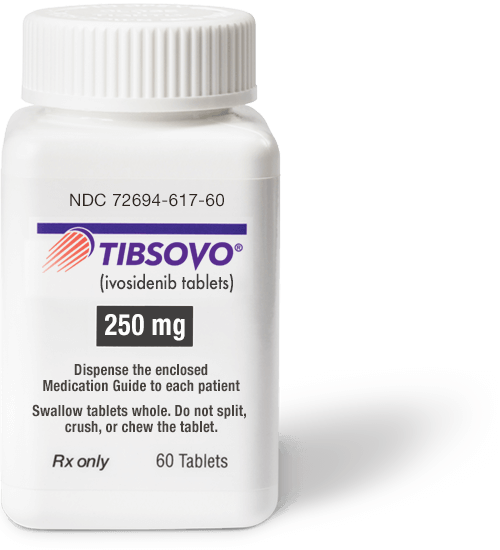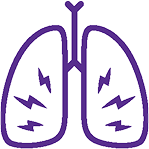Taking TIBSOVO
Before you take TIBSOVO
- Tell your healthcare provider about all of your medical conditions, including if you have any heart problems, have problems with abnormal electrolytes, have nervous system problems, have problems with your kidneys or are on dialysis, or have any liver disorders including cirrhosis
- Tell your healthcare provider if you are pregnant or plan to become pregnant. TIBSOVO may cause harm to your unborn baby. You should avoid becoming pregnant during treatment with TIBSOVO. Tell your healthcare provider right away if you become pregnant or think you might be pregnant during treatment with TIBSOVO. Tell your healthcare provider if you are breastfeeding or plan to breastfeed. It is not known if TIBSOVO passes into your breast milk. Do not breastfeed during your treatment with TIBSOVO and for 1 month after your last dose of TIBSOVO
- Tell your healthcare provider about all the medicines you take, including prescription and over-the-counter medicines, vitamins, and herbal supplements
- Especially tell your healthcare provider if you take hormonal contraceptives. TIBSOVO may affect how hormonal contraceptives work and may cause them to not work as well


Take 2 tablets orally, once a day. Taking TIBSOVO at the same time as another daily activity, like when you brush your teeth, can help you remember.
Download the TIBSOVO Dosing Calendar to help keep you on track.
Your doctor may prescribe TIBSOVO in combination with azacitidine to treat newly diagnosed AML. The two treatments work together to extend survival.
Azacitidine is administered by your healthcare provider in an office setting. Please consult your doctor to learn more about this combination regimen.
What to expect with TIBSOVO
Remember that TIBSOVO works differently than traditional chemotherapy. Because of this, there are some important things to remember during treatment:
- Take TIBSOVO exactly as your healthcare provider tells you to. TIBSOVO can take time to work. So if your AML does not progress and you do not have side effects you cannot tolerate, your healthcare provider may keep you on TIBSOVO for at least 6 months
- TIBSOVO may cause serious side effects, including differentiation syndrome
Responses and relapses occur at different times for different people, so it's hard to say exactly how long you’ll be on TIBSOVO. Your healthcare provider may keep you on TIBSOVO for at least 6 months if your AML doesn’t progress or you don’t have side effects you cannot tolerate. Wherever your treatment journey takes you, it's important to keep talking with your healthcare provider about your treatment plan.
Medicines are sometimes prescribed for purposes other than those listed in a Medication Guide. Do not take TIBSOVO for conditions for which it was not prescribed. Do not give TIBSOVO to other people, even if they have the same symptoms you have. It may harm them. You can ask your pharmacist or healthcare provider for information about TIBSOVO that is written for healthcare professionals.
- Store TIBSOVO at room temperature from 68 °F to 77 °F (20 °C to 25 °C)
- Keep TIBSOVO in the original container
- Keep the container tightly closed with the desiccant canister (drying agent) inside to protect the tablets from moisture
- Keep TIBSOVO and all medicines out of reach of children

Differentiation syndrome
Blood cells form through a process called differentiation. Some treatments for acute myeloid leukemia (AML), including TIBSOVO, can cause cellular differentiation to happen too fast. This is called differentiation syndrome.
Differentiation syndrome is serious and may be life-threatening. Differentiation syndrome in adults with AML has happened as early as the first day and up to 3 months after starting TIBSOVO.
Call your healthcare provider or go to the nearest hospital emergency room right away if you develop any of the symptoms of differentiation syndrome listed below.
In the clinical study, 1 in 7 people with newly diagnosed AML who took TIBSOVO in combination with azacitidine (11 out of 71) experienced differentiation syndrome.
In the clinical study, 1 in 4 people with newly diagnosed AML who took TIBSOVO alone (7 out of 28) experienced differentiation syndrome.
In the clinical study, about 1 in 5 people with relapsed or refractory AML who took TIBSOVO alone (34 out of 179) experienced differentiation syndrome.
 Contact your healthcare provider right away if you have any of the following symptoms of differentiation syndrome:
Contact your healthcare provider right away if you have any of the following symptoms of differentiation syndrome: -
 Fever
Fever -
 Cough
Cough -
 Trouble breathing
Trouble breathing -
 Rash
Rash -
 Decreased
Decreased
urination -
 Dizziness or lightheadedness
Dizziness or lightheadedness -
 Rapid
Rapid
weight gain -
 Swelling of your
Swelling of your
arms or legs
If you have differentiation syndrome, your healthcare provider may give you steroids or other medications and monitor you in the hospital.
It is important to let all of your healthcare providers know that you are taking a medication that can cause differentiation syndrome. The Differentiation Syndrome Reference Card can help. Print out the card, fill it out, and keep it with you at all items. Be sure to show it to any person involved in your medical care.
TIBSOVO may cause serious side effects, including:
- Differentiation syndrome, which may be life-threatening or lead to death
- Changes in the electrical activity of your heart called QTc prolongation. QTc prolongation can cause irregular heartbeats and can be life-threatening. Tell your healthcare provider right away if you feel dizzy, lightheaded, or faint
- Guillain-Barré syndrome. Tell your healthcare provider right away if you develop any signs or symptoms of Guillain-Barré syndrome, including weakness or a tingling feeling in your legs, arms, or upper body; numbness and pain on one side or both sides of your body; any changes in your ability to see, touch, hear, or taste; burning or prickling sensation; or difficulty breathing
- Changes in certain blood cell counts
- Diarrhea
- Increased blood sugar
- Fatigue
- Changes in certain liver function tests
- Swelling of arms or legs
- Decreased levels of electrolytes in the blood
- Nausea
- Vomiting
- Decreased appetite
- Joint pain
- Shortness of breath
- Uric acid increased
- Stomach (abdominal) pain
- Changes in certain kidney function tests
- Pain or sores in your mouth or throat
- Rash
- Irregular heart rhythm or heartbeat (QTc prolongation)
- Differentiation syndrome
- Muscle pain
These are not all the possible side effects of TIBSOVO. Call your healthcare provider for medical advice about side effects. You may also report side effects to the FDA (U.S. Food & Drug Administration) at 1-800-FDA-1088 or www.fda.gov/medwatch.
What is TIBSOVO?
TIBSOVO is a prescription medicine used to treat adults with an isocitrate dehydrogenase-1 (IDH1) mutation with acute myeloid leukemia (AML):
- with newly diagnosed AML treated in combination with azacitidine or alone who are 75 years or older or who have health problems that prevent the use of certain chemotherapy treatments
- when the disease has come back or has not improved after previous treatment(s)
Your healthcare provider will perform a test to make sure that TIBSOVO is right for you. It is not known if TIBSOVO is safe and effective in children.
IMPORTANT SAFETY INFORMATION
TIBSOVO may cause serious side effects, including:
- Differentiation syndrome. Differentiation syndrome is a serious condition that affects your blood cells and may be life-threatening or lead to death. Differentiation syndrome in adults with AML has happened as early as 1 day and up to 3 months after starting TIBSOVO. Call your healthcare provider or go to the nearest hospital emergency room right away if you develop any of the following symptoms of differentiation syndrome during treatment with TIBSOVO:
- fever
- cough
- trouble breathing
- rash
- decreased urination
- dizziness or lightheadedness
- rapid weight gain
- swelling of your arms and legs
If you develop signs and symptoms of differentiation syndrome, your healthcare provider may treat you with a corticosteroid medicine or a medicine called hydroxyurea and may monitor you in the hospital.
- Changes in the electrical activity of your heart called QTc prolongation. QTc prolongation can cause irregular heartbeats that can be life-threatening. Your healthcare provider will check the electrical activity of your heart with a test called an electrocardiogram (ECG) before and during treatment with TIBSOVO. Tell your healthcare provider right away if you feel dizzy, lightheaded, or faint
- Guillain-Barré Syndrome has happened in people treated with TIBSOVO. Your healthcare provider will monitor you for nervous system problems and will permanently stop your treatment with TIBSOVO if you develop Guillain-Barré syndrome. Tell your healthcare provider right away if you develop any signs or symptoms of Guillain-Barré syndrome, including:
- weakness or tingling feeling in your legs, arms, or upper body
- numbness and pain on one side or both sides of your body
- any changes in your ability to see, touch, hear, or taste
- burning or prickling sensation
- difficulty breathing
The most common side effects of TIBSOVO when used in combination with azacitidine or alone in adults with AML include:
- changes in certain blood cell counts
- diarrhea
- increased blood sugar
- fatigue
- changes in certain liver function tests
- swelling of arms or legs
- decreased levels of electrolytes in the blood
- nausea
- vomiting
- decreased appetite
- joint pain
- shortness of breath
- uric acid increased
- stomach (abdominal) pain
- changes in certain kidney function tests
- pain or sores in your mouth or throat
- rash
- irregular heart rhythm or heartbeat (QTc prolongation)
- differentiation syndrome
- muscle pain
Your healthcare provider will do blood tests before you start and during treatment with TIBSOVO. Your healthcare provider may decrease, temporarily hold, or permanently stop your treatment with TIBSOVO if you develop certain side effects.
TIBSOVO may cause fertility problems in females and males, which may affect your ability to have children. Talk to your healthcare provider if you have concerns about fertility.
These are not all of the possible side effects of TIBSOVO. Call your doctor for medical advice about side effects. You may report side effects to the FDA at 1-800-FDA-1088 or www.fda.gov/medwatch.
Before taking TIBSOVO, tell your healthcare provider about all of your medical conditions, including if you:
- have any heart problems, including a condition called long QT syndrome
- have problems with abnormal electrolytes, such as sodium, potassium, calcium, or magnesium levels
- have nervous system problems
- have problems with your kidneys or are on dialysis
- have any liver disorders, including cirrhosis
- are pregnant or plan to become pregnant. TIBSOVO can cause harm to your unborn baby. You should avoid becoming pregnant during treatment with TIBSOVO. Tell your healthcare provider right away if you become pregnant or think you might be pregnant during treatment with TIBSOVO
- are breastfeeding or plan to breastfeed. It is not known if TIBSOVO passes into your breast milk. Do not breastfeed during your treatment with TIBSOVO and for 1 month after your last dose of TIBSOVO
Tell your healthcare provider about all the medicines you take, including prescription and over-the-counter medicines, vitamins, and herbal supplements. Especially tell your healthcare provider if you take hormonal contraceptives. TIBSOVO may affect how hormonal contraceptives work and may cause them to not work as well.
Please see Full Prescribing Information, including BOXED WARNING for AML and MDS patients and Medication Guide.
What is TIBSOVO?
TIBSOVO is a prescription medicine used to treat adults with an isocitrate dehydrogenase-1 (IDH1) mutation with acute myeloid leukemia (AML):
- with newly diagnosed AML treated in combination with azacitidine or alone who are 75 years or older or who have health problems that prevent the use of certain chemotherapy treatments
- when the disease has come back or has not improved after previous treatment(s)
• myelodysplastic syndromes (MDS):
- when the disease has come back or has not improved after previous treatment(s)
IMPORTANT SAFETY INFORMATION
TIBSOVO may cause serious side effects, including:
- Differentiation syndrome. Differentiation syndrome is a serious condition that affects your blood cells and may be life-threatening or lead to death. Differentiation syndrome in adults with AML has happened as early as 1 day and up to 3 months after starting TIBSOVO. Call your healthcare provider or go to the nearest hospital emergency room right away if you develop any of the following symptoms of differentiation syndrome during treatment with TIBSOVO:


